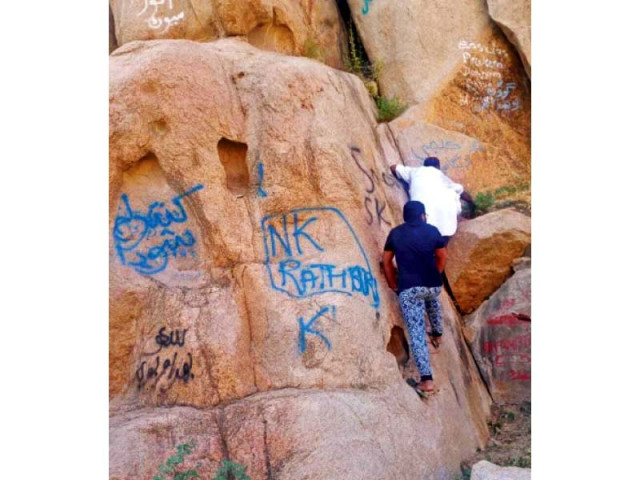Court bans crushing, mining at Karoonjhar Mountain
Nangarparkar judicial magistrate orders removal of machinery from Thar’s scenic mountain

A court in Tharparkar district has barred the companies engaged in mining and crushing of the scenic Karoonjhar Mountain to immediately halt their works and to remove their machinery as well.
“The respondents are unconditionally directed to remove all machinery and stop their work on all ranges of this mountain,” reads the order given on Friday by the civil judge and judicial magistrate of Nangarparkar taluka Karam Ali Shah.
The work has been ordered to stop because it is causing nuisance to the local community which has been protesting against the mountain cutting exercise from a long time. The main respondents in the instant case are Kohinoor Marble Industries Private Ltd and Frontier Works Organization (FWO).
“Court has reached the conclusion that cutting the mountain range is a pure act of public nuisance and it is [a] nuisance of large scale because it [mountain] is the source of life for two hundred thousand people of Nanagarpark,” the order reads. The local police has been directed to implement the order.
The stone cutting at Kharsar, Chanida and Dhanagam named stretches of the Karoonjhar Mountain range, which stretches to around 30 kilometers, in Nangarparkar has continued for many years. The court said the act is causing common injury, danger and annoyance to the public, specially the people who live in the proximity or own properties.
The judge observed that some rumours have been deliberately circulated to suggest that some powerful quarters are behind the mountain cutting. He further noted that some individuals in their private capacity have been benefiting from the cutting and they tend to give impression that they are connected with any institution of the state.
The order referred to section 133 of Code of Criminal Procedure contending that a judicial magistrate can take notice of a public nuisance causing activity through a police report or ‘other information’.
The judge said the mountain is a place of tourism and quoted a local saying which means that mountain lives in the hearts of the local people. The natural plantation and herbs grown at the mountain have their medicinal use while after seasonal rains sprawling pastures provide fodder for the livestock, he added.
The annual rainfall recorded at the mountain varies between a minimum of 50 millimeter to over 300 mm. The downpour triggers mountain streams and recharges the aquifers, which are the only drinking water source in the desert. There are at least 20 streams in mountain all of which are given names by the dwellers of the desert. The court noted that the Sindh government is constructing small dams in the region to store water.
The mountain is also home to some heritage and religious sites especially Hindu temples. “From the defence perspective it is like a defence wall located exactly at the border between Pakistan and India.” At the time of water the mountain caves are also put to use.
Read More: 'Polling material set on fire' as voting in Tharparkar's NA-221 by-polls concludes
The judge noted that Nangarparkar is already a backward area and destruction of the mountain will further deprive the people of their livelihood and sustenance. The companies were asked to submit documents of lease obtain from the government as well as the no objection certificates (NOCs) from the environment, wildlife, forest and tourism departments as well as the defence ministry. However, none were submitted.
“… the respondents aren’t maintaining the record which is mandatorily required under article 58 SMCR 2002.” The judge referred to a recent supreme court order concerning the same exercise at Margalla hills which the apex court said destroyed the landscape and natural beauty of the hills besides contributing to the environmental pollution. The court had stopped the crushing and mining at Margalla.
He quoted any Sindh High Court’s order to corroborate that a judicial magistrate has the jurisdiction to take notice of any activity causing nuisance to the community. “Karoonjhar has been dealt with by all the respondents as an ordinary mountain. The reality is totally different.”
The judge stated that tourism, culture, heritage, religion, agriculture, irrigation, livelihood, wildlife, forest and the defence are all connected with that mountain. “… cutting the mountain means cutting all sources of life of the people of Nangarparkar.”
He asserted that mining and crushing works on the mountains also violated the constitutional rights which are bestowed on the citizens, referring to the articles 9, 14, 18, 20, 28 and 38.
Heritage status
On January 8, 2021, the SHC’s Hyderabad bench of justice Salahuddin Panhwar and justice Amjad Ali Sahito had ordered forming of a high level committee of experts to decide mountain’s heritage status. The Sindh government notified the committee, comprising seven members, on January 26, 2021.
It was headed by Sindh secretary culture as its chairman. The director general Sindh antiquities, director general mines and minerals, former archaeology secretary Dr Kaleemullah Lashari, Sindh university geology department’s director and historian Dr Mashkoor Phulkaro.
Almost a year has passed but the committee has reportedly not even held its meetings in an apparent violation of the SHC’s order. “Former secretary Culture Akbar Laghari once called me and said lets hold a meeting on zoom. But all members including me couldn’t participate in that meeting,” Phulkaro, who authored two books on Tharparkar, told The Express Tribune.
Published in The Express Tribune, January 8th, 2022.


















COMMENTS
Comments are moderated and generally will be posted if they are on-topic and not abusive.
For more information, please see our Comments FAQ